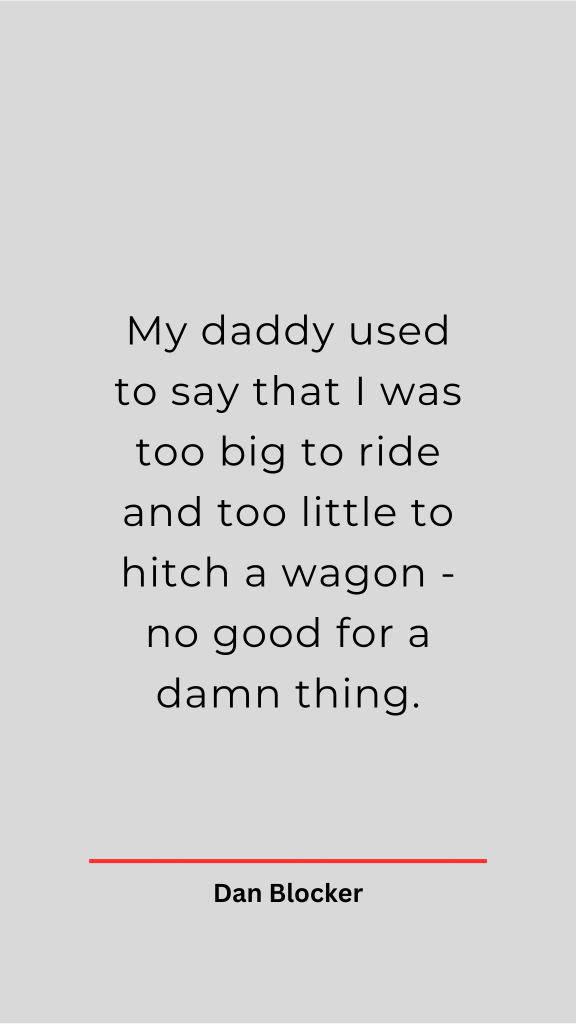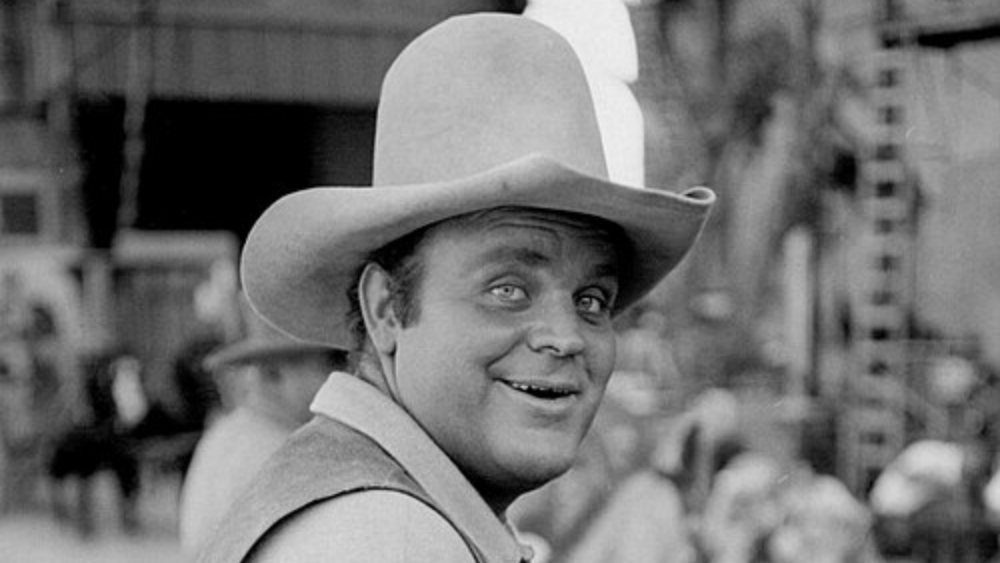Bobby Dan Davis Blocker was born on December 10, 1928, in DeKalb, Texas. Few could have predicted his future success. He became a beloved TV icon and a real-life war hero. Dan Blocker is best known for his role as “Hoss Cartwright” on the hit western Bonanza. However, his life was about more than just Hollywood stardom. Before fame, he served as a dedicated soldier and earned the Purple Heart for bravery during the Korean War.
Humble Beginnings and a Passion for Performance
Raised in the small town of O’Donnell, Texas, Blocker was known early on for his kindness and extraordinary physical stature. Even in high school, he stood out—literally and figuratively. At nearly 6’4″ and weighing over 300 pounds, he was a gentle giant with a deep interest in academics and the arts. He attended Texas Military Institute and later played football at Hardin-Simmons University before transferring to Sul Ross State Teachers College.
There, he earned a degree in speech and drama and cultivated a love for performing. But before he could pursue acting full-time, Blocker’s journey would take a patriotic turn.
A Soldier’s Story: Service in the Korean War
In 1951, Dan Blocker was drafted into the United States Army during the Korean War. Assigned to the 45th Infantry Division, he quickly rose to the rank of sergeant and was stationed in some of the war’s most dangerous zones. Blocker served with distinction on the front lines, where brutal combat and harsh conditions tested every soldier’s courage and endurance.
His unit fought in battles such as Old Baldy, Pork Chop Hill, and Hill Eerie—names that have since become synonymous with intense and bloody conflict. Blocker was wounded while trying to rescue fellow soldiers, an act of bravery that earned him the Purple Heart. He was later evacuated and returned to the United States, where he was honorably discharged in 1952.
His military accolades extended beyond the Purple Heart. He received the Korean Service Medal with two bronze campaign stars, the United Nations Service Medal, and the Combat Infantryman Badge. Each award represented a chapter of courage and sacrifice during a harrowing time in American history.
Returning to Civilian Life and a New Purpose
After his military service, Blocker didn’t immediately head for Hollywood. Instead, he married his college sweetheart, Dolphia Parker, and started a family. He pursued graduate studies and earned a master’s degree in dramatic arts. Supporting his young family, Blocker worked as a high school teacher, teaching English and drama in Texas, New Mexico, and California.
Yet the call of the stage never left him. While teaching, he began auditioning for television and film roles in Los Angeles. His size, booming voice, and natural charisma made him a standout in an industry always searching for larger-than-life personalities.
Rise to Fame: The Making of Hoss Cartwright
In 1959, Dan Blocker landed the role that would define his career—Eric “Hoss” Cartwright in Bonanza. As one of the central figures in the show’s Cartwright family, Hoss became a symbol of compassion, loyalty, and strength. Audiences quickly fell in love with his warmth, humor, and the unique mix of brawn and tenderness he brought to the screen.
Bonanza became a cultural phenomenon and ran for 14 seasons, with Blocker appearing in more than 400 episodes. His portrayal of Hoss resonated with viewers around the world and cemented his status as one of television’s most beloved characters.
Blocker’s off-screen persona matched his character’s integrity. Colleagues frequently described him as intelligent, thoughtful, and deeply devoted to his family. Despite the demands of fame, he remained humble and avoided the trappings of celebrity excess.
A Man of Principle and Heart
Throughout his life, Dan Blocker carried the lessons of war and sacrifice with him. He often spoke candidly about the impact of combat and the realities faced by young men thrown into conflict. His wartime experiences gave him a perspective on life that few others in Hollywood shared. He believed in honesty, fairness, and the power of kindness—values he infused into his work and personal life.
Even during the height of his fame, Blocker expressed discomfort with the wealth and celebrity status that came with being a TV star. He famously remarked that he sometimes felt guilty making more money in a week than some people earned in a year of hard work. Also, he remained grounded, choosing to live a relatively quiet life away from the Hollywood spotlight whenever possible.
Dan Blocker also invested in community ventures and even co-owned a chain of restaurants called Bonanza Steakhouse, which capitalized on the success of the show while bringing affordable meals to families across the country.
Family, Legacy, and Impact
Dan and Dolphia Blocker raised four children—two daughters and two sons. One of his sons, Dirk Blocker, followed in his father’s footsteps and became an actor, appearing in shows such as Brooklyn Nine-Nine. Another son, David, became a producer and has earned industry awards for his work.
Despite his premature death, Dan Blocker’s legacy lived on through his family, his work, and the lives he touched. In his hometown, a statue and a street have been named in his honor. Dan Blocker Beach in Malibu, California, commemorates his impact not only as an actor but as a local and national treasure.
A Sudden Goodbye
Tragically, Dan Blocker passed away on May 13, 1972, at the age of 43, due to a pulmonary embolism following gallbladder surgery. His unexpected death shocked fans and colleagues alike. Bonanza made history by acknowledging his death in the series—a rare move for TV at the time. It was one of the first shows to address the passing of a main character as a real-life event within its storyline.
The absence of Hoss Cartwright left a hole in the show and in the hearts of viewers. Many believe that Bonanza never truly recovered from Blocker’s loss, and the series ended just over a year later.

The Significance of the Purple Heart
The Purple Heart is one of the most sacred military honors in the United States, awarded to those who are wounded or killed in combat. Receiving this decoration is a testament to a soldier’s bravery, sacrifice, and service. Dan Blocker saw the Purple Heart as more than a medal—it symbolized the courage he showed when he put others before himself on the battlefield.
Blocker was part of a rare group of entertainers who not only served their country but suffered wounds in the process. He earned his place among heroes long before he became a TV icon.
Why Dan Blocker Still Matters
Dan Blocker’s life is a compelling example of strength wrapped in kindness. He embodied a unique combination of physical power and emotional warmth that set him apart from many of his peers. But more than his appearance or fame, it was his integrity, his humility, and his commitment to doing what was right that made him unforgettable.
He showed the world that it’s possible to be a warrior and a peacemaker. He was both a hero and a humble man. Dan Blocker was a teacher and a star. He commanded classrooms, led soldiers through dangerous terrain, and brought joy to millions as Hoss Cartwright. His legacy reflects courage, character, and compassion.
His story reminds us that the people we admire on screen often have deeper stories of honor and resilience. Blocker wasn’t just playing a hero—he truly lived like one.
In Conclusion
Dan Blocker’s legacy is a powerful blend of service and storytelling. From his formative years in Texas to the front lines of Korea, and eventually to the sound stages of Hollywood, he remained steadfast in his values. His Purple Heart serves as a reminder of his bravery, while his iconic performances continue to entertain and inspire new generations.
Though he left this world far too soon, his influence endures. Dan Blocker is, and continues to be, a gentle giant who embodied both battlefield valor and heartfelt entertainment throughout his life. He showed us all that real heroes don’t just wear uniforms. They also wear cowboy hats, crack warm jokes, and live their lives with integrity.











